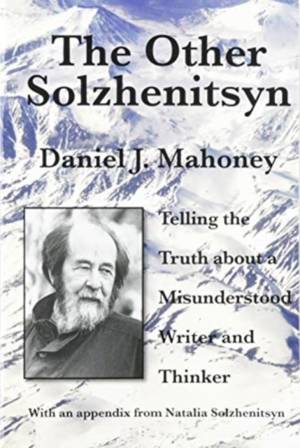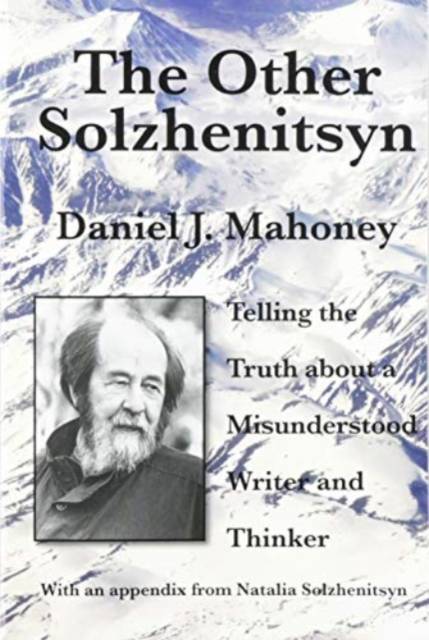
- Retrait gratuit dans votre magasin Club
- 7.000.000 titres dans notre catalogue
- Payer en toute sécurité
- Toujours un magasin près de chez vous
- Retrait gratuit dans votre magasin Club
- 7.000.0000 titres dans notre catalogue
- Payer en toute sécurité
- Toujours un magasin près de chez vous
The Other Solzhenitsyn
Telling the Truth about a Misunderstood Writer and Thinker
Daniel J Mahoney
Livre broché | Anglais
30,95 €
+ 61 points
Description
The great Russian writer Aleksandr Solzhenitsyn (1918-2008) is widely recognized as one of the most consequential human beings of the twentieth century. Through his writings and moral witness, he illumined the nature of totalitarianism and helped bring down an 'evil empire.' His courage and tenacity are acknowledged even by his fiercest critics. Yet the world-class novelist, historian, and philosopher (one uses the latter term in its capacious Russian sense) has largely been eclipsed by a caricature that has transformed a measured and self-critical patriot into a ferocious nationalist, a partisan of local self-government into a quasi-authoritarian, a man of faith and reason into a narrow-minded defender of Orthodoxy. The caricature, widely dispensed in the press, and too often taken for granted, gets in the way of a thoughtful and humane confrontation with the "other" Solzhenitsyn, the true Solzhenitsyn, who is a writer and thinker of the first rank and whose spirited defense of liberty is never divorced from moderation. It is to the recovery of this Solzhenitsyn that this book is dedicated.
This book above all explores philosophical, political, and moral themes in Solzhenitsyn's two masterworks, The Gulag Archipelago and The Red Wheel, as well as in his great European novel In the First Circle. We see Solzhenitsyn as analyst of revolution, defender of the moral law, phenomenologist of ideological despotism, and advocate of "resisting evil with force." Other chapters carefully explore Solzhenitsyn's conception of patriotism, his dissection of ideological mendacity, and his controversial, but thoughtful and humane discussion of the "Jewish Question" in the Russian - and Soviet twentieth century. Some of Solzhenitsyn's later writings, such as the "binary tales" that he wrote in the 1990s, are subject to critically appreciative analysis. And a long final chapter comments on Solzhenitsyn's July 2007 Der Spiegel interview, his last word to Russia and the West. He is revealed to be a man of faith and freedom, a patriot but not a nationalist, and a principled advocate of self-government for Russia and the West.
A final Appendix reproduces the beautiful Introduction ("The Gift of Incarnation") that the author's widow, Natalia Solzhenitsyn, wrote to the 2009 Russian abridgment of The Gulag Archipelago, a work that is now taught in Russian high schools.
This book above all explores philosophical, political, and moral themes in Solzhenitsyn's two masterworks, The Gulag Archipelago and The Red Wheel, as well as in his great European novel In the First Circle. We see Solzhenitsyn as analyst of revolution, defender of the moral law, phenomenologist of ideological despotism, and advocate of "resisting evil with force." Other chapters carefully explore Solzhenitsyn's conception of patriotism, his dissection of ideological mendacity, and his controversial, but thoughtful and humane discussion of the "Jewish Question" in the Russian - and Soviet twentieth century. Some of Solzhenitsyn's later writings, such as the "binary tales" that he wrote in the 1990s, are subject to critically appreciative analysis. And a long final chapter comments on Solzhenitsyn's July 2007 Der Spiegel interview, his last word to Russia and the West. He is revealed to be a man of faith and freedom, a patriot but not a nationalist, and a principled advocate of self-government for Russia and the West.
A final Appendix reproduces the beautiful Introduction ("The Gift of Incarnation") that the author's widow, Natalia Solzhenitsyn, wrote to the 2009 Russian abridgment of The Gulag Archipelago, a work that is now taught in Russian high schools.
Spécifications
Parties prenantes
- Auteur(s) :
- Editeur:
Contenu
- Nombre de pages :
- 256
- Langue:
- Anglais
Caractéristiques
- EAN:
- 9781587316173
- Date de parution :
- 29-01-21
- Format:
- Livre broché
- Format numérique:
- Trade paperback (VS)
- Dimensions :
- 150 mm x 226 mm
- Poids :
- 385 g

Les avis
Nous publions uniquement les avis qui respectent les conditions requises. Consultez nos conditions pour les avis.






